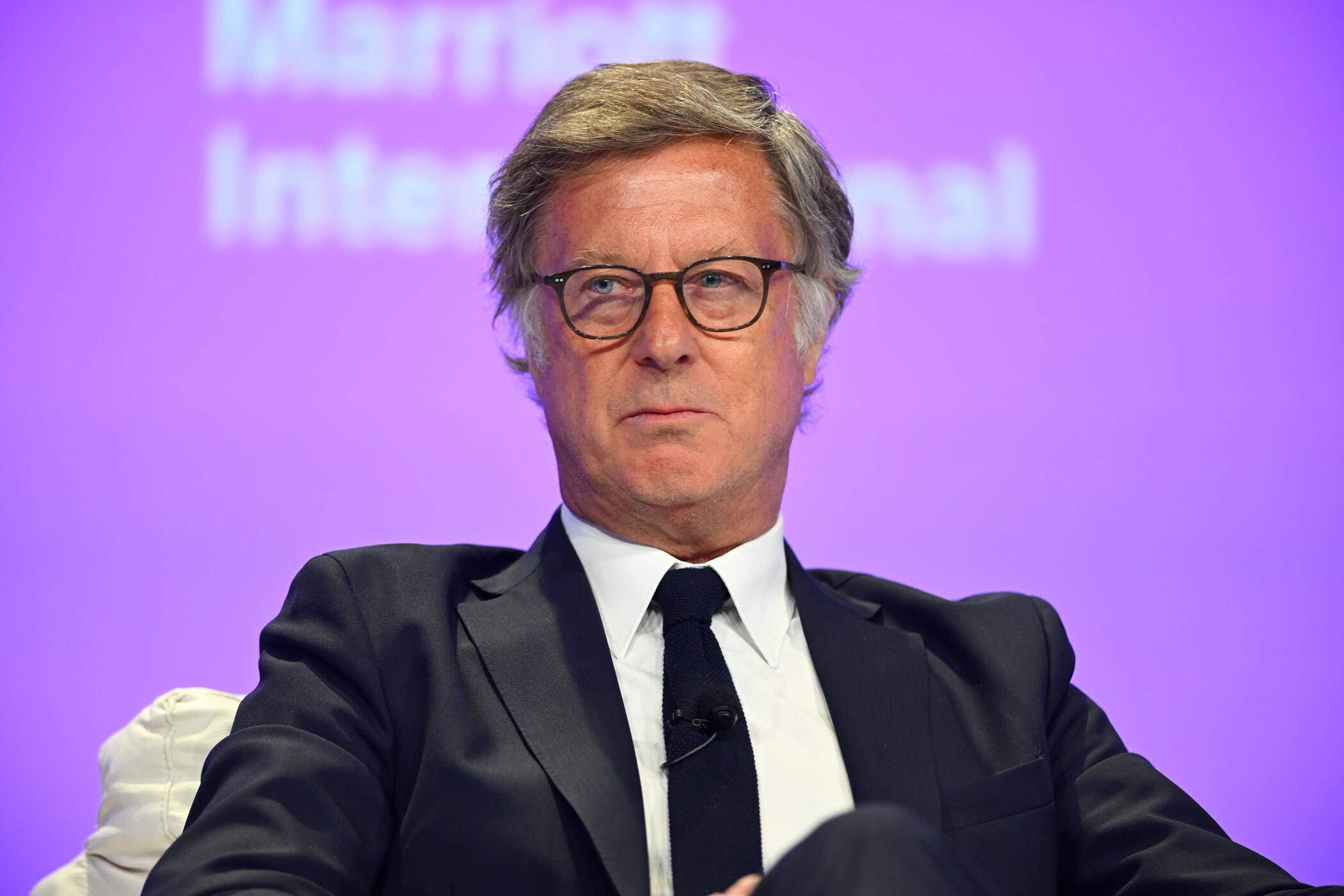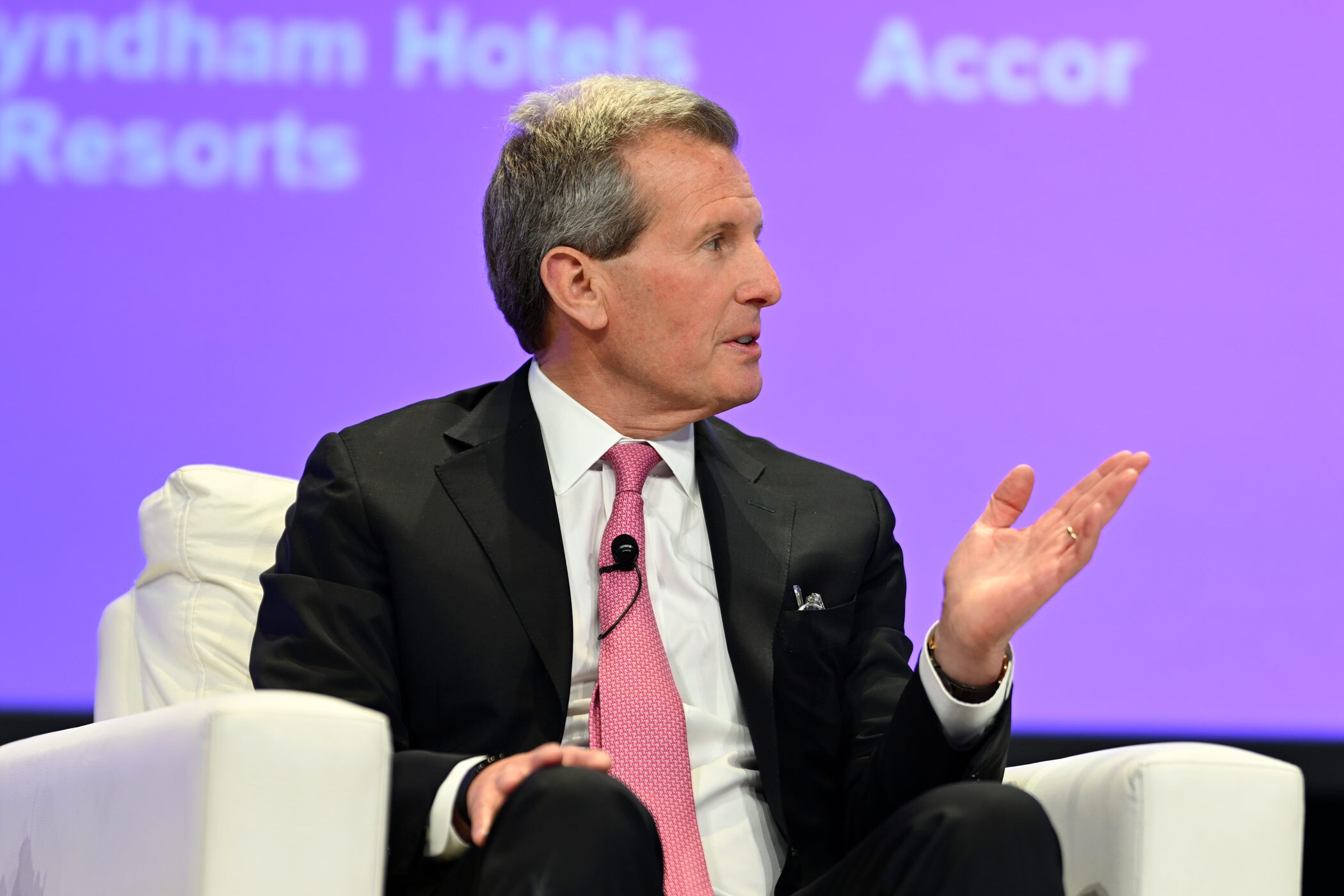NEW YORK — Executives from the hospitality industry's largest brand companies gathered for a lively discussion about the biggest issues for the hotel business — from macroeconomic headwinds and market opportunities to the travel sector seeing consumers reprioritize how they spend their money.
Throughout the panel discussion at the NYU International Hospitality Investment Forum, the current macroeconomic headwinds and the Trump administration's actions affecting the industry came up immediately. Each of the hotel CEOs explained why they didn't feel like conditions were as bleak as things might seem. With most of the companies represented on the stage altering their outlook for the rest of the year following a slow start to 2025, executives addressed recent promising metrics that make them feel more hopeful.
"In virtually every market that we all operate ... we're seeing good RevPAR growth — it's a combination of both occupancy and average rate, which is really encouraging. We're all seeing really vibrant activity on the growth side of the equation as well, which would suggest that the owner and franchise community fundamentally believe, long term, in the strengths and the fundamentals the industry."
—Anthony Capuano, president and CEO of Marriott International, when asked about how hotel demand is fairing this year so far.
"We're seeing forward pace for transient business start to slow down maybe two months out, and then it gets weaker and weaker, and then as the date of travel comes closer and closer, it comes back up. So, we realized business is actually not suffering very much, but the pace numbers were really weird."
—Mark Hoplamazian, president and CEO at Hyatt Hotels Corp., on how tracking future bookings has been an unreliable metric. He added that caution in the market can slow demand, but the luxury segment is up double digits.
"Stylistically, the way [the Trump] administration is getting things done is different than what you've seen in other administrations. ... The world is getting used to this a little bit, you know, a little bit different style."
—Chris Nassetta, president and CEO of Hilton, when asked about the Trump administration. He added that even though the hotel brands lowered their 2025 outlook for the year on their last earnings calls, it was a conservative action in line with what the market was seeing.
Eyes on the White House
Without being highly critical of the Trump administration, the executives did express that so far, the travel industry seems to have fallen out of focus for the government. Some CEOs agreed that they hoped this would change toward the end of the year, while others said the onus was on the travel industry to pick up the slack.
"I think we'd all agree it's an administration that is more willing to listen. We've spent more time already than we did in the four years previous in terms of advocacy in D.C."
—Geoff Ballotti, president and CEO at Wyndham Hotels & Resorts, said, adding that everyone on the stage signed a letter asking the U.S. government to invest in marketing the country overseas.
"We can sign letters all day long, but the reality is, at the moment, there's not enough oxygen for a lot of issues, not just our industry, but certainly we're in that group. ... I do believe that when we get through this summer, when we get to the fall, there's a very good likelihood that there's going to be more oxygen for other issues."
—Nassetta, explaining that the Trump administration has had more pressing issues to tend to for the time being.
"We've got to make international visitors feel welcome. We've got smooth perceptions about how they will be treated when they come through customs and immigration. And I think the creation of these task forces is certainly a very positive first."
—Capuano, speaking on the current administration's actions that have led to discouraging international inbound travel.

"I spend less than 5% of my time trying to understand any government policy. I don't give a damn. ... Just be agile. Understand and accept it's going to be bumpy. I don't spend fraction of my time changing the politicians' mind. I'm spending the time with my employees, with the owners, with the guests, with new design and with new trends culture, with connection, with community, with identity, but not with politics."
—Sébastien Bazin, group chairman and CEO of AccorHotels
Hot markets for growth
When it comes to international opportunities for growth, the hotel brand executives discussed China, the Middle East, and India at great lengths. Each market has its own set of opportunities, and the consensus was that there's plenty of opportunity for everyone.
"China will be a great business for us, and I'm guessing everyone on this panel, for a long, long time. ... India has an incredibly young population, a population that loves to travel, that ultimately is going to become one of the top outbound markets in the world too. So, I would say in the last few years, things have shifted that way. ... I look at the markets where it's like a 10x opportunity — [it's the] Middle East and India."
—Nassetta
"Three years ago, everybody was a China bull. Everybody today is a China bear. We don't agree with that. We think China is still a huge opportunity, still in the early stages."
—Elie Maalouf, CEO of IHG Hotels & Resorts, adding that many other parts of Asia — Japan, Vietnam, South Korea, Singapore and Thailand — are seeing double-digit growth.
"I've been a bull on India ... and I've been wrong for 17 of the 19 years. The last two years, it's actually coming to fruition."
—Hoplamazian, adding that he's thinking about the next two decades not the next two weeks, months, or even years.
"When you [go] to India from your airports and you try to drive between points, you're not finding that affordable, predictable Western brand along the highways and byways of India. And it's a huge, huge opportunity — that infrastructure development."
—Ballotti, pointing to government support in the country sparking hotel growth. He also added that the Middle East is the company's fastest growth market.
Other areas of opportunity
In the broad scope of the travel industry, there are other growth opportunities besides just underserved markets. For extended stay, for instance, there's been a rise in demand that hasn't yet been met with a matching rise in supply. And, while luxury is seeing strength, there's a swath of the population still looking to book their first trip.
"In many of the markets where we operate, we've seen this bifurcation with the consumer, and it's why you see so many of us doubling down on luxury and accelerating entry into tiers like midscale. We entered midscale for the first time two years ago, and it is a rapidly growing segment for us, and it is reflective of what we're seeing with the consumer and most of the markets where we are."
—Capuano

"I think would all agree that there's just tremendously more demand in extended stay than there is supply right now. And all of us have new brands targeted at the extended stay, which is often in the economy segment, but the shortage of housing, the shortage of affordable accommodations for the 1.8 million companies across the nation that are contracting for that infrastructure business to stay are looking for that blue-collar worker to stay in an affordable economy — hopefully new construction — extended-stay product." —Ballotti
"For the 1 billion people on this planet that have never taken a vacation yet, luxury is their first hotel stay. That's their definition of luxury."
—Maalouf, reminding the crowd of the market opportunity for first-time travelers — especially for gaining loyal customers.
'The network effect'
On the topic of customer loyalty, the executives agreed that they want to be everywhere their customers are. No traveler stays in one chain scale, and many aspire to rise through the ranks.
"For us, the strategy is a network attack. We're in premium economy, and we're in luxury, and we want to be at every price point in between because we think we can prove scientifically that if we give people good products, good service, loyalty, relevant technology that really works for them, and we knit it together with a network that serves all their different needs. ... If you give them all of those things and you have enough dots on the map in the right places, with product quality, service quality, we believe you get an unfair share of their wallet, and you are able to then drive incremental market share and perform well, which attracts more capital and allows you to grow faster. ... When you wake up in 10 or 20 years, a lot of the growth is going to be in the mid-market. We'll all be at both ends of the spectrum, but the big fat tire around the waist is going to be the mid-market."
—Nassetta, explaining that growth in the middle class will define growth for the industry when everyone looks back in 20 years.
"From our perspective, we're forced to move from up to down because we've only been in the up so far, and so we are now trying to fill the upper and midscale layer. But we do think keeping it adjacent is important, because, again, that trading behavior means that your loyalty members need to be, need to have something contiguous."
—Hoplamazian, adding that while Hyatt is expanding its chain scales, it's doing so in a consistent manner.
Consumer reprioritization
Consumers still want to travel, and it's a trend the hospitality industry has seen for a few years as the post-COVID consumer values experiences more.
"Across all countries, all segments — people have really prioritized travel. Coming out of the pandemic, whether there's uncertainty, even in recent turbulence, the allocation of their personal resources — of their time, how they want to live their life — they're saying, 'I'm going to cut things first. Travel, I'm going to protect to the extent that I can.'"
—Maalouf
"I think it's this next massive group of travelers that are just getting started on their travel journey, just getting started in their careers. Some number of years in the future, we're going to be talking about that group trading up as their careers evolve. As they generate more family wealth, they're gonna be moving up the chain scales."
—Capuano
"I think our businesses are more resilient. Our owners' businesses are more resilient. I think our customers are more resilient."
—Nassetta, adding that the hotel industry is not immune to macroeconomic factors, no industry is, but the business came back after COVID and that was a challenge.
"I agree with everything that's been said in terms of prioritization and allocation of disposable income. It's become more of a human need ... people need community. They need to see family. They need to engage and connect with customers, with colleagues. It's a need. It's not a discretionary item that comes and goes."
—Hoplamazian said, pointing to the trend affecting both business and leisure travel.
"There's a silver economy right around the world — an aging of the population that's retiring, but retiring healthier and wealthier than any generation before in the U.S., in Europe, in Asia, in China and Japan, people that are gonna live to 80 to 90 years old."
—Maalouf
